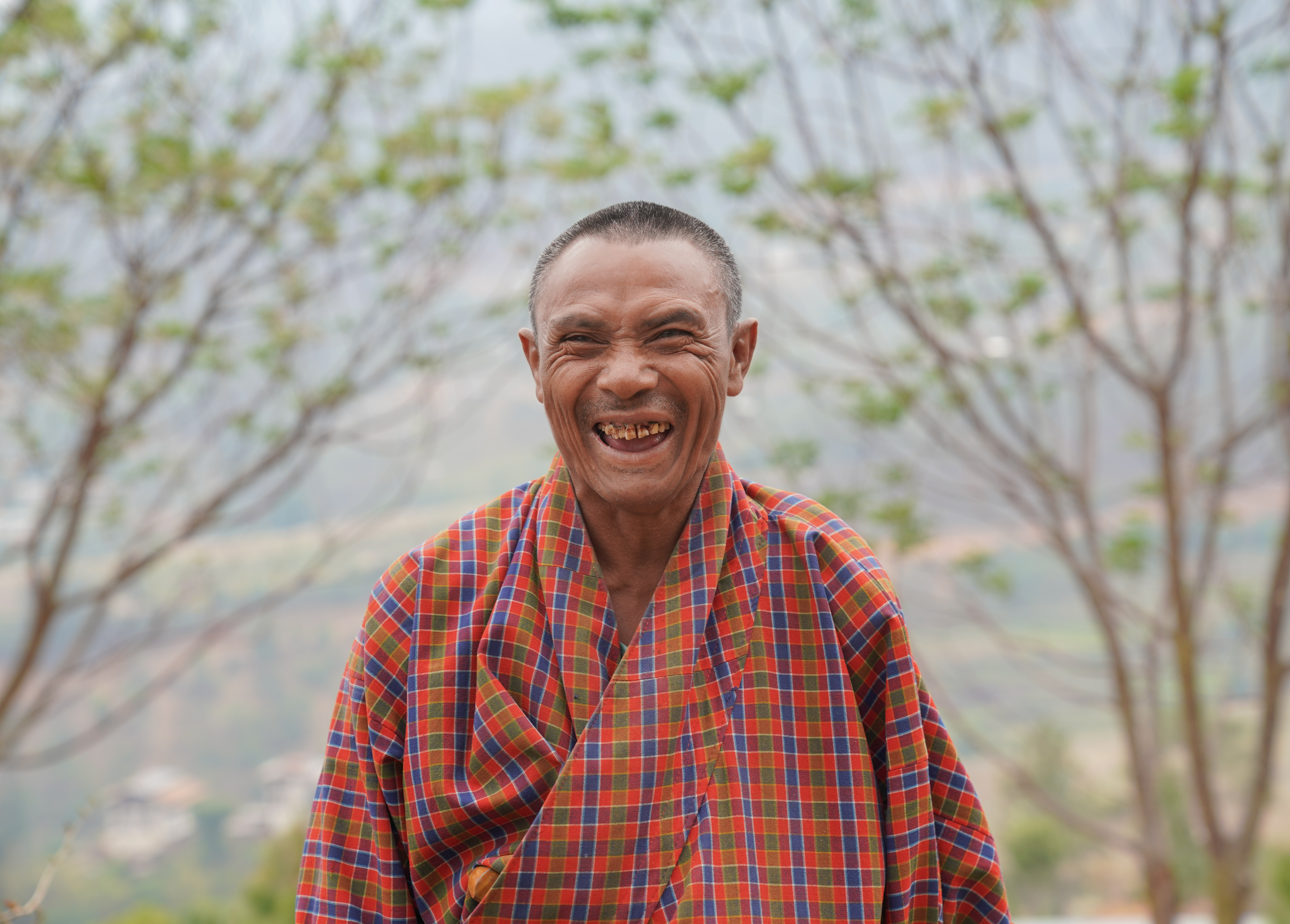A water supply scheme supported by UNDP and Global Environment Facility’s Least Developed Countries Fund (GEF-LDCF) to solve the perennial drinking water shortage.
Ending water scarcity in Toeb and Barp communities
May 29, 2024

Carlos Manuel Rodriguez, CEO and Chairperson of the Global Environment Facility with Toeb and Barp communities in Punakha district during his visit to Bhutan in April 2024
Taps run bone dry often. Pipe leakages occur countless times and the community chu-sup (water in charge) must leave everything behind and rush to the sites to fix it. During monsoon, landslides damage water pipes. And worst, there is not enough water at the source itself sometimes especially during monsoon.
This is a struggle that’s all too familiar to the people of Toeb and Barp communities in Punakha district who have endured water scarcity for decades.

Damcho Wangchuk, Chairperson of Toebisa Water Association
“I can barely remember a time when we did not struggle with drinking water shortage,” said Damcho Wangchuk from Toeb gewog.
Damcho Wangchuk is the Chairperson of Toebisa Water Association. “The government has tried to solve the issue many times, but the problem persisted.”
A large part of the problem stemmed from the fact the water source lies in a rugged location far away from the communities, which made it difficult to maintain the water source regularly. During monsoon, the source remains inaccessible more often than not.

Gomchen is the Chu-suup (water in charge) of Barp gewog
Gomchen from Barp gewog had worked as the community’s chu-sup. “It takes an hour on foot to get to the source. The water shortage worsened in recent years as the settlements and population in the two communities mushroomed.”
But this longstanding problem will be solved once and for all. A nature-based and climate-resilient water supply scheme is being built. The scheme will provide much needed steady supply of drinking water supply to Toeb and Barp communities, home to 900 households and 10,000 plus people.

Pema Tshenzom is a community member form Gamakha village in Barp Gewog
“We were elated when we first heard about the project,” said Pema Tshenzom from Gamakha village in Barp Gewog. “We can’t wait to see this problem become a thing of the past. It would be a dream come true to live without having to worry about water. This in turn will also improve our health and hygiene.”
The drinking water supply scheme is a part of the Royal Government of Bhutan’s $8.9 million project, supported by the GEF's Least Developed Countries Fund and UNDP. The project launched in September 2023 is working towards addressing water shortages and declining water quality in Bhutan, twin trends driven by the global climate crisis.

Carlos Manuel Rodriguez, CEO, Global Environment Facility engaging with the community members
On 1 May 2024, the CEO and Chairperson of the Global Environment Facility (GEF), Carlos Manuel Rodriguez met and interacted with the people from the two communities. He described the project and community engagement as one of the key highlights of his visit to GEF-LDCF supported project sites.
“It is, from the socio-economic point of view, one of the most rewarding initiatives, that I have seen. Although Bhutan has one of the highest per-capita water availability in the world, the water sector is extremely vulnerable to the impact of climate change,” said Carlos Manuel Rodriguez.
With an additional US$25 million in co-financing from the Royal Government, the five-year project, “Advancing Climate Resilience of the Water Sector in Bhutan (ACREWAS)”, will benefit more than 37,000 people in the three Dzongkhags of Gasa, Punakha, and Tsriang, some of the most climate vulnerable regions of the country.
“This is why the LDCF is so important in helping communities to become more resilient to climate change but at the same time being able to understand that the climate change is here to stay and that they can prosper as communities if they are able to invest in water governance, nature-based solutions, community-based approaches so the agricultural and water sectors can be able to withstand the highest impact of climate change.”
The status of the water supply scheme work
The groundbreaking ceremony for the water supply scheme for Toeb and Barp communities was conducted on 20 May 2024.

Inauguration of the Barp and Toeb gewog water scheme
The scheme aims to enhance resilience and adaptation to climate change through integrated water resource management and infrastructure.
A water intake structure with a capacity of 150 cubic meters will be constructed at the source to ensure a steady and reliable supply of water. Five water storage tanks will also be constructed, providing enhanced storage capacity to meet the needs of the community.
To ensure efficient water distribution, a 17-kilometer-long pipeline will be installed, stretching from the source in Okalum to Lobesa.
A water treatment plant will be constructed at Dashiding in Lobesa, to ensure clean and safe water.
To address any potential issues or complaints related to the project, grievance redressal committees have been established in both the gewog and Dzongkhag levels. The committees will provide a structured platform for stakeholders to voice concerns and seek resolutions.
The overall cost of the water infrastructure project is estimated at Nu 93.24 million. Besides local residents, the water supply scheme will also benefit four schools, a college, a nunnery and government offices in the vicinity. Other areas of support encompass water governance through Payment foe ecosystem services (PES), Water User Associations, innovative financing solutions, and the development of a Dzongkhag water master plan.
For more information, please contact:
Ms. Dechen Wangmo, Communications Analyst, UNDP Bhutan | Email: dechen.wangmo@unmpd.org

 Locations
Locations


